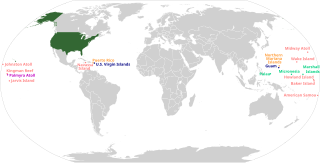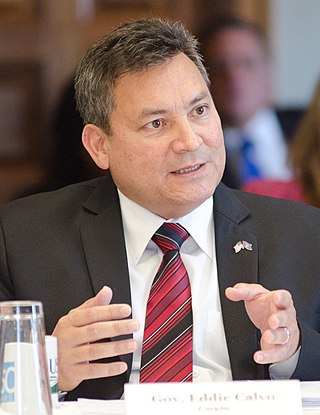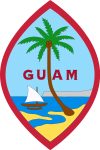
A referendum is a direct vote by the electorate on a proposal, law, or political issue. This is in contrast to an issue being voted on by a representative. This may result in the adoption of a new policy or specific law, or the referendum may be only advisory. In some countries, it is synonymous with and also known as plebiscite, votation,popular consultation, ballot question, ballot measure, or proposition.

The Gramm–Rudman–Hollings Balanced Budget and Emergency Deficit Control Act of 1985 and the Balanced Budget and Emergency Deficit Control Reaffirmation Act of 1987 were the first binding spending constraints on the federal budget.

The 51st state is an American political discourse term that refers to areas that are considered to be candidates for U.S. statehood, joining the current 50 states that have already been constituted in the United States since 1959. The phrase has been applied to external territories, as well as the country's capital for the District of Columbia and parts of already-existing states which would be admitted as separate states in their own right.

Proposition 58 was a California ballot proposition on the March 2, 2004 ballot. It passed with 4,535,084 (71.2%) votes in favor and 1,841,138 (28.8%) against. It was officially called the California Balanced Budget Act. It requires the state legislature to pass a balanced budget every year, which means that budgeted recurrent expenditure, including repayment of past debt, does not exceed estimated revenue. The act does not require that capital works programs be funded out of current revenues. The California Constitution has always allowed bond issues for specified capital works, above a certain value. Bond measures must be approved by a statewide ballot.

In California, a ballot proposition is a referendum or an initiative measure that is submitted to the electorate for a direct decision or direct vote. If passed, it can alter one or more of the articles of the Constitution of California, one or more of the 29 California Codes, or another law in the California Statutes by clarifying current or adding statute(s) or removing current statute(s).
General elections were held in Guam on November 2, 2004 in order to elect all 15 members of the legislature, the federal delegate, mayors of 14 cities, vice mayors of three cities, the public auditor, the Consolidated Commission on Utilities, two judges of the Superior Court, running for retention and the Guam Public Education Policy Board. Voters also voted on the President of the United States although the territory sent no representatives to the electoral college. There was also a referendum on allowing gambling, which was rejected by voters.
A balanced budget amendment is a constitutional rule requiring that a state cannot spend more than its income. It requires a balance between the projected receipts and expenditures of the government.

Edward Jerome Baza Calvo is an American politician who served as the 8th Governor of Guam from January 3, 2011 to January 7, 2019. A member of the Republican Party, Calvo was a five-term Senator within the Legislature of Guam. He became the Governor of Guam, having defeated Democrat Carl Gutierrez in the 2010 gubernatorial election. Calvo chose Senator Ray Tenorio as his running mate for Lieutenant Governor of Guam.

The Budget Control Act of 2011 is a federal statute enacted by the 112th United States Congress and signed into law by US President Barack Obama on August 2, 2011. The Act brought conclusion to the 2011 US debt-ceiling crisis.
Six referendums were held in Switzerland during 1938. The first four were held on 20 February; the first on amending articles 107 and 116 of the constitution to make Romansch an official language, which was approved by over 90% of voters and all cantons. The second was on a popular initiative "on urgent federal resolutions and the protection of people's rights" and was rejected by 85% of voters. The third was on a popular initiative on the private arms industry, and was also rejected by a wide margin, whilst the fourth was on a counter-proposal to the arms industry question, and was approved by voters. The fifth referendum was held on 3 July on the penal code, and was approved. The sixth and final referendum of the year was held on 27 November on a federal resolution on the transient order of the federal budget, and was approved by 72% of voters.
A two-part referendum was held in Guam on 4 August 1979. A proposed new constitution was rejected by 82% of voters, whilst a law introducing the death penalty was rejected by 53% of voters. In August 1987 a referendum was held on another proposed constitution, with each chapter voted on separately. Two chapters were rejected by voters, resulting in a second referendum in November in which both were approved.
Five referendums were held in Switzerland during 1950. The first was held on 29 January on extending a federal resolution on promoting housebuilding, and was rejected by voters. The second was held on 4 June on the federal budget, and was also rejected by voters. The third was held on 1 October on a popular initiative "for the protection of ground and labour by prohibiting speculation", and was rejected by voters. The final two were held on 3 December on revising article 72 of the constitution regarding the election of the National Council and a federal resolution on financial order between 1951 and 1954. Both were approved by voters.
A series of four referendums on casinos and senators was held in Guam on 5 November 1996. A reduction of the number of senators from 21 to 15 passed, but proposed term limits for senators failed. Voters approved a measure limiting the budget for parliamentary business to 2.5% of the national budget, and rejected a proposal to permit casinos to open on the island.
Ten referendums were held in Switzerland during 1998. The first three were held on 7 June on a federal resolution on a balanced budget and two popular initiatives "for the protection of life and environment against genetic engineering " and "Switzerland without secret police". Whilst the balanced budget proposal was approved, both popular initiatives were rejected by voters. The next three referendums were held on 27 September on a federal law on truck tolls based on engine size and two popular initiatives "for well-priced foodstuffs and ecological farms" and "10th revision of the Aged and Bereaved Insurance without raising the retirement age". Whilst the toll law was approved, both initiatives were rejected.

The 1984 Virginia State Elections took place on Election Day, November 6, 1984, the same day as the U.S. Presidential, U.S. Senate, and U.S. House elections in the state. The only statewide elections on the ballot were two constitutional referendums to amend the Virginia State Constitution. Because Virginia state elections are held on off-years, no statewide officers or state legislative elections were held. All referendums were referred to the voters by the Virginia General Assembly.

Parliamentary elections were held in the Federated States of Micronesia on 5 March 2019, alongside a referendum on calling a Constitutional Convention. All 14 seats in Congress were up for election, and all 13 incumbents standing for re-election were returned to Congress.

This national electoral calendar for 2020 lists the national/federal elections held in 2020 in all sovereign states and their dependent territories. By-elections are excluded, though national referendums are included.

A three-part referendum was held in Liechtenstein on 30 August 2020. Voters were asked whether they approve of an initiative proposing changes to the constitution to promote the equal representation of women in political bodies, a parliament law allowing dual citizenship for naturalised citizens, and a decision by the government to fund a railway line expansion. All three proposals were rejected.









